Gina Harris's Blog, page 64
October 6, 2020
The mystery of the mutant sunflower
It has been a bad day, and I am too angry to write well about a complex topic. I'll figure it out.

In order to write something at all, I am going to write about the mutant sunflower. It does fascinate me.
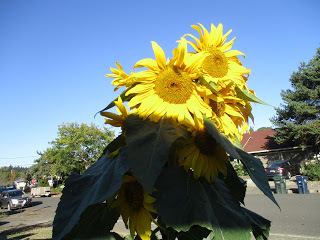 I did an internet search to see if anyone had similar issues. I found one entry on a UK gardening site from 2016.
I did an internet search to see if anyone had similar issues. I found one entry on a UK gardening site from 2016.
One person suggested that there was probably damage at the stem, resulting in an errant bud. That would have had to have happened about twenty times. When I first saw all the extra buds I wasn't even sure they would be viable. Some waited longer, but they are still coming through.

I would be shocked if we get any seeds from this one.

Another suggestion was that a seed for a multi-branching breed got mixed into the seed packet. They said to look forward to being able to pick for bouquets.
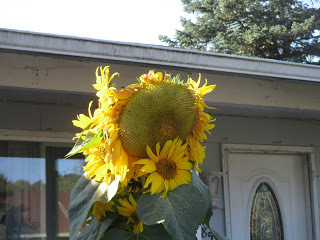
That comment made sense, because looking at multi-branching varieties they do tend to have longer stems. They also don't tend to have that one big "normal" head surrounded by all the little ones. The big one is starting to lose the petals; is has been blooming longer and now it has all the little heads crowding it out, but it followed a normal growth trajectory.

No one came up with an answer that seemed to match.
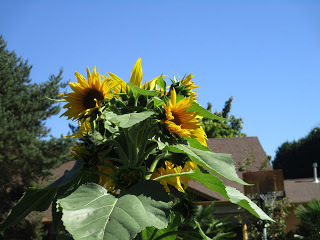
I am guessing it is some kind of accidental hybrid. I have enjoyed watching it, and now even as all of the sunflowers are starting to droop, watching and waiting for seed formation is interesting. I don't care if birds take them all; I just want to watch it happen.
And it is really good to have a garden when you have days like today.
October 5, 2020
Thoughts on The Social Dilemma
I admit that hype makes me very suspicious. When I started seeing people talking about how scary or disturbing The Social Dilemma was, I raised an eyebrow.
Where I really went in prejudiced against it was when someone who had just watched it responded "Fake news!" to a story that wasn't fake. I mean, there was room to argue the story's significance, but to dismiss it so quickly, and with such a parroted phrase... maybe it has the wrong message.
Having watched the movie now, it's a little more complicated.
The unalloyed praise I will give it is that Vincent Kartheiser is a really good actor, and choosing him was great casting. He brought nuance to his three roles as Engagement, Growth, and Advertising AIs, and not everyone could pull it off as well. I have nothing bad to say about him.
I will say that the movie indicated a level of it being personal that doesn't ring as true for me. I won't really fight it though. If there is a level where if you realize that your brain is changing and that you are acting in ways that are not in your best interests because some various groups want your attention and so the social media company that you use is manipulating you to sell that attention... even if it's not personal for them, it may be reasonable to act as if it is personal for you.
I did roll my eyes a little at the older sister who raised the warning voice but was mostly ignored being named Cass. Subtle.
Otherwise, my concerns about it are a couple of minor ones that relate to a big one.
Let's start with the hype. I will never be able to read Dan Brown because of how much people like him. He may be a good author but I don't know and that's on me. However, I do have a friend who was excited to read him and got out some art history books, and found some easy errors, So maybe my feelings about hype have some basis in people getting excited about things that don't stand up to the scrutiny.
With the hype for this movie, people are finding it eye-opening and scary. I hope that doesn't lead to panic and poor decisions, like someone deciding to disconnect and losing a reliable source of human contact. Some interactions are toxic, but not all of them are. There were people raising alarm bells about girls finding pro-anorexia and bulimia sites back in 2004 at least, and there was definitely cyber-bullying happening then, but there have also been people finding support systems there. Internet has been a lifesaver for queer teens who have a hard time finding acceptance or role models close to home.
That leads to a reminder that a lot of this information is not new. I have been aware of Jaron Lanier's work for about a decade now. I'm not saying that there haven't been any changes, but if The Social Dilemma was a total surprise to you, then you should think about what news sources you are using, and if there might be ways you could be better informed.
Is that a little concern or a big concern? Let's get to that other "little" thing: an absence of fact-checking on a statement accepted as fact.
Linguist Dr. Caitlin Moriah posted an awesome rebuttal to Tristan Harris' throwaway comment that people didn't panic when bicycles were new, because they did:
https://threadreaderapp.com/thread/1310312499355422720.html
This is very worth reading. For me, the line jarred me because I remembered something about a "bicycle smile" that would have been seen as a corrupting element. Dr. Moriah knows a lot more, and she told it in a fun manner.
I would feel better about The Social Dilemma if they had fact-checked that comment. Maybe it seemed obviously true to them, so they let it pass, but that seems like it could disqualify them from being good guides for us.
You may also have noticed that they weren't really guides. Did you get an answer other than deleting your social media - either just from your phone or completely - and did it feel helpful? Once the youngest daughter grabbed a hammer to free her phone from the timer safe, sure her father was going to talk to her, but what was he going to say?
Otherwise the answer is for the people in tech to get a conscience, or maybe some laws can get passed to save us from ourselves. Does that sound likely?
I have read some other pretty good things on what was missing from the movie, and I will link them at the end.
On my own I noticed one glaring abyss of a crater or a lack, but that becomes a much bigger topic that even naming will cause some people to be offended, and yet ignoring it causes a perpetual cycle of trouble.
I'll save that for tomorrow. For now, I recommend the following three links:
https://slate.com/technology/2020/09/social-dilemma-netflix-technology.html
https://threadreaderapp.com/thread/1308542908291661824.html
https://threadreaderapp.com/thread/1306341560548757505.html
October 2, 2020
Comedy specials
When I was coming up with my original list of movies to watch, I saw that Robert Townsend had directed Eddie Murphy: Raw (1987). I had seen the clip about Bill Cosby criticizing Eddie Murphy for using bad language of course, but I had really not watched any comedy since they quit having the standup spotlight on VH-1. That felt like a gap.
After some looking at my options, I ended up also watching Richard Pryor... Here and Now (1983, directed by Richard Pryor), The Original Kings of Comedy (2000, directed by Spike Lee), and The Original Latin Kings of Comedy (2002, directed by Jeb Brien).
(Jeb Brien is really more of a music video guy, but you shouldn't need a lot of direction for a comedy special. I did like the "Low Rider" segment, but see, that was kind of music video-ish.)
I didn't laugh nearly as much as I'd hoped to.
Of course, comedy is often very contemporary, and may not age well, except that I know bits that have, from a few different comics. I would still be laughing at old Bill Cosby records if he hadn't ruined that by being a rapist.
Well, that might relate.
That's not saying that all of the comics are terrible people, either, but they weren't always punching up, at least; lots of homophobia.
Some of it was really sad. When Eddie Murphy was talking about breaking his engagement because of being unable to trust that he wasn't being used, and the people wanting to pick fights now that he's famous... sometimes I cringed for him and sometimes I just felt really sorry for him.
I think I could really enjoy listening to Bernie Mac now if he were still alive and doing comedy. That makes me sad in a different way.
As it was, my favorite moment was with Richard Pryor. People in the audience were handing him different objects to riff on, and someone handed him a live hermit crab. Pryor did talk to the creature, imagining its thoughts, but he also made sure to have someone put it somewhere safe, remembering that it was a living creature. There was a tenderness that touched me.
Putting all of them together made me wonder if there was really a good place for comedy, with all the self-loathing it seemed to thrive on.Maybe that is not the best way to get our entertainment.
Except, even though there are a lot of things I can't find funny, I laugh all the time. I have done comedy sets here and there, and it was only really self-loathing once. People still laughed, a lot, but people laughed when it wasn't coming out of terrible pain too. I know that it's possible, but the trend often seems to be comics who may have too much self-hatred or too little integrity or some combination that makes it impossible for them to condemn serial sexual predators.
I might still be wondering about it, but I finally started that free Netfllix trial. That's how I watched The Social Dilemma, and that's how I watched Hannah Gadsby: Nanette (2018, directed by Madelaine Parry and Jon Olb).
Wow.
I remember reading about how it was the future of comedy, but also that it announced Gadsby's retirement. Yes, I remember the obligatory jokes about how could it then be the future, like it couldn't possibly mean that other comics would move in that direction.
I don't know if they will, but they should.
If you haven't seen it - and reading about it is no reason not to - apparently a lot of Gadsby's previous humor was based on her coming out, and being a lesbian and mining the humor from that. She did still talk about that, and worked in her art history background really well, but she gave a fuller picture, with things she had previously kept hidden. The story about a man starting to beat her up because he thought she was a man hitting on his woman, then realized his error and apologized because he didn't hit women... there is humor to that, though it is humor with an ugly side. But there's more.
Keeping it a joke meant not telling the rest of that story, where he beat her up anyway because she was a lesbian, and not very feminine, so hitting was okay.
There were a lot of stories and a lot of laughs, but there was also raw emotion, and a realization that she had frozen her trauma to be able to get laughs from it, and the reason she needed to leave comedy was to heal.
That was powerful on its own, but while I was finding it, I saw another special. I wondered what her previous shows were like, for comparison, so I planned to watch it.
It wasn't previous.
Hannah Gadsby: Douglas (2020, directed by Madeleine Parry)
It was new, and it was funnier.
It was still meaningful. It still made good use of the art history background. It was still personal as she went over getting a late autism diagnosis and some of the misconstrued evidence along the way.
Masterful job of managing audience expectations.
And also, for all the fun we could have listening, I bet it was more fun for her too.
It's not that her past pain didn't inform her art, but she didn't have to drag around the extra baggage of unhealed wounds.
Who knew?
If that's not the future of comedy it should be.
October 1, 2020
Director Spotlight: ROBERT TOWNSEND
Had already seen: none
Watched for this: Hollywood Shuffle (1987), Eddie Murphy: RAW (1987), The Five Heartbeats (1989), B*A*P*S (1997)
Have not seen: Lots
Robert Townsend has 41 director's credits, as well as many production, writing, and acting credits.
When I started this focus on Black directors, I had originally planned to watch 22 films, including four by Townsend. I ended up adding at least ten films (I am still looking for some) and several shorts, because in many cases I felt compelled to view more. That has not been the case with Robert Townsend. I got very frustrated with him.
I saw Raw and The Five Heartbeats first, and I didn't love them, but I didn't hate them. With The Five Heartbeats, the two brothers bought a big home for their whole family based on their success; it seemed unlikely to me that they could have a falling out so big where Duck never knew that his nephew was named after him. Like, your mother never told you and tried to get you to make up? But okay, the script was based on events they wanted to happen, not completely organically: that happens a lot.
It was easy to see where the same guy who did The Five Heartbeats also did that opening in Raw; very similar aesthetic and feeling.
Where I started to get mad at Townsend was with B*A*P*S. It's not just that it was pretty stupid (and still pretty inorganic), but it was stupid in insulting ways that did not respect the dignity of the cast. I had a hard time finishing it.
When reading about it I learned that it was the first time that Townsend was working with a script that he hadn't written, and that made me feel very sorry for Troy Byer, who had written it.
She does not seem to be bitter. She acknowledges that it was a first for him, and if she didn't feel like her work made it on to the screen, at least she was able to try directing her own work later. I feel less forgiving.
(Two separate points on that: I don't know whom to blame for not having the title word figure at all in the movie and then be a surprise at the end; that was just weird and pointless. Also, Halle Berry is distractingly pretty, even with everything they did to make her look ridiculous.)
Then, with Hollywood Shuffle, my feelings became more complicated.
There were definitely some laughs, and there were things that were less funny.
One big joke that didn't land for me was in the Jheri Curl section, where the woman's breath was bad, but they were going to do it anyway, because he likes doing it. Bad breath is kind of gross, and you can play that up in a couple of different ways, but that didn't happen. It was just there for a meaningless "ick".
(Actually the repetition of "I like doing it" was pretty funny, but there were other ways of working it in.)
Then of course there was the humor that could be uncomfortable in that it was illustrating how racial stereotypes make things difficult for Black people in the film industry. That discomfort serves an important purpose. If laughter makes it go down better, great!
My problem was that there didn't seem to be a lot of kindness to the other characters, actors or fast food workers or relatives. It wasn't dark comedy either, where you expect everything to be a little scabrous and that's the tone. It was just that no one else mattered so much.
At the end other people could talk about how sincere and appealing Bobby was - after giving up on his Hollywood dreams and going to work at the post office gets him a gig in a commercial about working at the post office - but none of the other characters get to be that special and appealing.
I felt sympathy too, because I do not doubt many bad experiences in Townsend's career, leading up to this film and continuing after. If he had really been giving Hollywood up to work at the post office, this might have been that scabrous comedy.
Instead, Hollywood will remain for him, but you can just go work at the post office. Then ten years after making this, he would become the bad experience for yet another writer/actor/but not yet director.
September 30, 2020
The dilemma of using social media
In deciding how you will use social media, it has to be for you. I went over my usage yesterday, not because that's how everyone should do it, but because tracing the journey might give you ideas for your own.
But yes, there is programming being done to increase the amount of time that you spend on social media. (My issues with The Social Dilemma can wait until next week.)
For example, lately on Facebook I am seeing notification about things like a friend updating a status, or one friend commenting on another friend's photo. They must not have enough notifications about things that relate directly to me. Okay.
Initially I checked on those things, assuming that the notification meant it was pertinent to me in some way. Now I have started ignoring them. I don't have a problem with knowing that Becky commented on Shannon's photo, but I don't need to know. I have also un-followed a lot of pages, because I was seeing more from them than from friends.
Ages ago I wrote about not letting Facebook stress you out. At the time, a lot of that was gaming requests, and my solution was blocking all of the apps. I sometimes blocked invitations from people who played every game, but usually blocking the applications as they came in was enough. There was a time when I played those games and sent invitations too; four of my friends came about through Hatchlings. Now I don't even know if it's a thing.
The first part of this post is really to decide how you want to use social media, and then how to do that.
Good questions to ask yourself might include...
Am I neglecting things that are important to me because of my time spent on social media?Am I surprised when I see how much time has passed after I have been viewing social media?Is my mood worse after seeing posts? Does it make me scared, angry, or sad?Am I getting misinformed through social media?
Not all potential answers are going to be about social media use. Some people have issues with comparing to others, and then feeling worse. That may indicate more of a need to deal with personal insecurities, which can be harder than limiting social media but also more beneficial.
I know someone who has felt hurt multiple times because she expresses herself on Facebook and then it feels like everyone is attacking her. Yes, one possible conclusion is that she has horrible friends and should block them, but in this specific case the issue is that she has horrible opinions and people are largely being really gentle with her. That requires a different solution (and more self-awareness than is likely, because she is unfriending and blocking).
The analysis can be tricky, but ultimately you are checking for a gap between how you are interacting with social media, and how you want to. That may require multiple decisions.
I don't know much about business use; I have discovered that I cannot sell myself, so while I do occasionally link to my books, that's the extent of it for me. You can use Facebook for friends and Instagram for customers, or have separate profiles for personal and business, or link everything so that when you post on Instagram in automatically tweets and posts on Facebook.
(However, if you do want to have some social media use for your business, you should take note of whether your target market prefers one platform to another, and how they use it.)
For personal use, then it becomes a lot more emotional. Especially now, during a pandemic, does it help with connection and support? Does it add to stress? That doesn't have to be how you get support, but if you feel yourself more stressed or depressed as you use it, that is a good reason to change.
As I wrote yesterday, my priority is relationships. That is why I do things like #RememberSeptember where I want to reach out to people and remind them that I care and that we have had good times. It has been very rewarding, and I am going to keep it going into October for a while.
Maintaining relationships is also why I have put a 30-day snooze on a lot of people. Sure, that's great for now, but at some point next month when things are really heating up they are all going to expire and I may start feeling like I hate everyone. However, I know that. I will recognize when it is happening. That's the benefit of thinking these things through.
Being more mindful may help on its own. Scheduling specific times to check your feeds might work. Deleting the apps from your phone - and only viewing social media on a PC - might work. There are apps that will time your usage.
One of the movie subjects talked about deciding to leave his phone in his car, or to not look at his phone, and then not being able to resist the temptation. If that's you, you may need to enlist help.
I never post on Instagram, because you have to do it through the app, and you can't install the app on a PC. Years of cheap phones have gotten me used to not doing social media on my phone. The technology has advanced enough that my $15-on-Ebay phone can handle social media, but I like that it is not always with me. When I am away from the keyboard, I have no idea if my posts are being liked or argued with, and I like that.
If I were an artist, and Instagram seemed like the best way to market my work, I would have to find a way to deal with that. Maybe it would be having Instagram on my phone, but still leaving Facebook and Twitter for the computer only.
As long as you are not doing harm, I don't think there is any wrong way. However, doing harm can include spreading misinformation, stressing out other people, and it can include harm to yourself, so please take that caveat seriously.
These are just ways of thinking about it, and I hope they can be helpful. Now I want to address that second part of post (and the movie), for which I am completely unqualified.
I do not know how to help your kids on social media.
I do know, with that guy who said his teenagers don't use any social media at all... I think he is fooling himself. Or more accurately, I suspect his kids are fooling him.
To have forces that are working on altering on the brain working on the still-developing brains of young people is a scary thing. That's not just the psychology. One theory on why children are starting puberty sooner is that the screen light fools the brain into thinking they have been alive for longer, seeing more days. It's not the only theory, but it gives me pause.
Without having the answers for that (but believing in the importance of respect and open communication), I want to say that I got really irritated watching the phone-less teen flopping around on his bed, bored. Pick up a book! Draw something! Listen to some tunes!
And I thought that, but then I remembered that a lot of the educational materials for reading now turn kids off of reading, and that music, art and PE have been cut from schools.
With the reading thing (that is from The Book Whisperer in my education reading), I am not saying that those companies specifically don't want kids to read, but they want to make money and so they may not have the best interests of the kids at heart. Also, maybe teaching to the test isn't the best idea.
Regardless, a lot of those things being cut come from people (and especially companies) trying to get away with paying as little as possible, though education is a valuable investment. Furthermore, even a lot of people trying to revolutionize education are trying to make students into good future workers, instead of people who understand their world and how to navigate it and live satisfying lives within it.
I believe if we aim for the latter, we will have people who are then perfectly capable of being good workers, unless you're just against critical thinking skills.
I'm just saying, there's a bigger picture.
September 29, 2020
Putting the "me" in social media
One thing I will have to do to successfully blog regularly is write ahead. Yesterday I started a post that was getting too long, but I realized it was because I didn't lay the proper groundwork. That's what I need to do today, going over my social media usage and history.
The first thing I realized is that it is much bigger than I thought. When I think social media, I think Facebook, Twitter, and Instagram, plus lots of things that I know exist but I have never tried.
Then I remembered that Goodreads allows messages and likes and I have a profile. Blogger is a little different, at least in how you get feedback, but at least social media adjacent.
Then I remembered I tried Tumblr, and I have profiles on at least two fiction sites, and I am on a film networking site that is completely useless, but I still get notifications. I set up on Wordpress, but because I was used to Blogger it didn't stick. I kept remembering other things.
Therefore, my first point is that your online footprint is probably larger than you realize. That may leave you some vulnerabilities for hacking, especially if you reuse passwords.
It's not even that I didn't know that. I finished Zoe Quinn's Crash Override on May 4th (I can tell you that because of Goodreads) and I have left it on my desk since then because I thought I should go through and clean my online presence up. I haven't done it yet. Getting around to things can be a problem, but at least take time to think about it.
So, if we are including Blogger, I got on that just before the end of 2006, and added the travel blog in 2008 after our Australia trip, which is also when I got on to Facebook and Goodreads. (I added the Preparedness blog a few months later so I could archive newsletters.) Twitter didn't come until 2012, and has been the most transformative.
I initially got on Twitter because I was into Grimm and it didn't seem to have much of a Facebook presence. It was coincidental that I got on about two weeks before a coworker got me into the Misfits and I remembered that I had liked those two My Chemical Romance songs.
Lots of things happened from that. Because I followed various bands, a lot of bands followed me. I wanted to do something with that. That's how the music reviews started, and it eventually informed the songs of the day. I had liked music before, but I was listening to more and newer music.
A lot of people who liked the same music followed me. They tended to be much younger. A lot of them had issues with depression. That started me reading a lot more about psychology and recovery. It was not a complete change - Psychology Today had been one of my favorite magazines since college - but it became more targeted, especially as I begin to recognize more of my own experience in theirs.
I don't remember for sure if it was the music or something else that led to the comic book stuff, but it was definitely the comic book stuff (and mostly Gail Simone) that led to intersectional feminism.
It was definitely on Twitter that I first learned about Trayvon Martin's shooting, and I learned about it from a Grimm writer.
My point there is that a lot of it wasn't deliberate. For example, after I finished one personal writing project (the script for a comic book based on an MCR album) I felt like it was time for something different. One girl tweeted a lot of people on that next #FollowFriday. That's not a common practice anymore, but people used tweet other accounts to follow on Fridays. I usually ignored it, but that day I followed around 80. Come to think of it, that's when the increased interest in psychology kicked in.
While I had not planned things out in advance, the paths I followed were nonetheless dictated by my interests and values. I believe that is why I have ultimately been happy with the results.
There have been adjustments. Initially I automatically followed back everyone who followed me. A lot of people follow you to advertise to you; I learned that quickly. Some people retweet a lot of questionable content. Sometimes it may be best to un-follow, but you can keep following someone while turning off re-tweets.
I have decided that the important thing for me is relationships.
For Twitter that means that I keep the accounts I follow at a relatively low number. (Currently 1266, and followed by 1242.) I have made some friends there, but I also use it more for learning things, because that is how it works for me.
On the other hand, Facebook (for me) means keeping up with people I already know (mostly). I have used it for arranging in-person contact (pre-pandemic) and I am really dedicated to remembering people on their birthdays.
I use both Facebook and Twitter for putting out my blog posts and daily songs. Lately I have seen more opportunities to do good with the daily songs: using them for encouraging donations, promoting service opportunities, and now for sharing memories with other people. Those have come up because social good is important to me, and because people are important to me.
All of those efforts have had blog posts:
https://sporkful.blogspot.com/2020/06/fundraising-and-music.html
https://sporkful.blogspot.com/2020/07/christmas-service-style-in-july.html
https://sporkful.blogspot.com/2020/08/remember-september-next-round-of-daily.html
There have been many changes in the way I use social media over time, but they have all been ones that have made it better for me. That is where I will be going with the next post, which will also cover my use (or the lack thereof) of Instagram.
September 28, 2020
My best way to help
At one point last week I was thinking about posting that if anyone needed help they could tag me in. That didn't feel quite right, especially as I remembered that I have just gotten to the point where I am merely low energy and not exhausted all the time.
I have been trying to think about what would be a good fit.
It came from seeing more people who have not been political in the past posting political things. I have talked to some of them and I know it is a matter of conscience for them; they feel like they need to say something now. I totally get that. It is also a great way to find out exactly how obnoxious some of your friends and family are, and how reprehensible their beliefs.
The people I was watching skirmish that day were using their own strengths and interests. They probably don't really need my help, and may not want it. I know that you may not want everyone piling on your friend. There was one dust-up that definitely caused one person to unfriend me and I think it was part of why the other one left Twitter, and that all happened while I was making dinner.
So while it is certainly possible that there may be a time when you post something important to you, and someone else is being rotten about it, maybe tagging me in would help, and be something I could do, but it is probably not the only way we can help each other.
I recently watched The Social Dilemma. I should be writing more about tomorrow, but the answer is frequently going to be about making conscious choices, and then there are a lot of options.
One option is refuting your friends, and letting other, bolder friends help.
That can get very adversarial. I have found my bulldog self many times since I have gotten on Facebook (October 2008), and I can hold on tirelessly. As a result, I think a lot of the more conservative people I have known from church or school have muted me or unfriended me, and that can be okay.
You don't want to get yourself into an echo chamber, and I am not recommending that. That is a big part of why on Twitter I follow people who are both more and less radical than I am. Sometimes they are irritating, as am I. However, I don't follow anyone who promotes racism or misogyny or any kind of bigotry, because those things are not up for debate. Also, - and I want to make this very clear - you are NOT obligated to maintain a relationship with someone who is abusive.
That may involve name calling - "baby killer" is very popular right now - but it may be something more subtle. You may find that someone is stressing you out by posting the same arguments every single time, even when you thought you had already answered them. You can try and set a boundary, and if they ignore that, that can be reason enough to delete a Facebook friendship. I did that with one person, he said he understood, and then he kept flooding me with direct messages after having lost the ability to post on my wall. I blocked him. It wasn't what I'd wanted, but it felt like the only option.
Your time and your mental health are important. There are sayings about wrestling with pigs and playing chess with pigeons - I don't disagree with them, but the real problem tends to be humans.
Sometimes there is reluctance to let someone go, because it feels like that means they are winning the argument. They probably will think that, but they will probably think that after still more hours of arguing. Is that worth the effort?
I say that as someone who has held on tenaciously, possibly with no reward other than that person ignoring me in the future. (Which can be worth something.)
Sometimes it is worth it. Recently I had an exchange with my brother pointing out that when he talks about open season on liberals, that's all of his sisters. It wasn't fun and I think it irritated him more than anything else. It also still felt important to do. I don't think he really wants us dead, but I also think he is spoiling for a fight, which is a concern, and that other people reading those memes are more violent and shorter-fused. I believe words matter.
I also believe that if you make a point, it might not sink in right away, but if enough other points hit over time, it may add up. That can be good. It's probably not worth getting an ulcer over.
Sometimes it is nice to have your friends come in and help in an argument, but there are other ways we can help each other, and these are some things to think of:
Maybe at some point you want a fact-check or a logic-check; we can do that for each other.
Maybe you need someone to remind you that you are a good person and your values are humane and just; we can do that for each other.
Maybe you need a sounding board over whether it is okay to sever ties with someone; we can do that for each other.
These are rough times. Let's be kind, and also firm.
Sometimes that means a firm and loving goodbye, and sometimes it doesn't.
Serenity, courage, and wisdom: they are useful in many situations.
September 25, 2020
Bad idea movies
I did not want to see Where Hands Touch - even though I was watching the work of Amma Assante - because I thought the movie was a bad idea. Oh, a romance between a Nazi and a Black girl! How original! She can even be a little anti-Semitic, because we really aren't all that different!
Yes, African-American anti-Semitic sentiment has been a problem (see Jesse Jackson, circa 1984). Also, while the Nazis were focused on Jews, they had some prejudices against Black people as well (see Jesse Owens, 1936). Of course, racism does not rule out attraction - some people have seen that turn pretty quickly - so it's not that it's impossible, but what do you gain from it? Even if it is handled super well, which can so easily not be the case.
That was how I felt in 2018. Then in 2019 three other movies screamed "Bad idea!" at me. I have read quite a bit about them while conscientiously not seeing them, but then because I have not seen them I was reluctant to blog about them; I mean, I don't really know.
So in honor of Amma Assante I am going to throw all my caution out the window today, and rip on movies that I haven't seen.
There will be spoilers.
Richard Jewell
It became very obvious from the trailer where this was going, when you hear the profile of the Olympic bomber being a white man. How dare they make that about race? You can hear Clint Eastwood thinking it.
However, the bomber Eric Rudolph was white, and had some similarities with Richard Jewell where it was not completely unreasonable that given Jewell's proximity to the scene he would be investigated. He was never charged. I will gladly acknowledge that law enforcement can be heavy-handed - Portland sure knows that! - and that the media could have handled it better.
In return it would be great if Eastwood would acknowledge that the mass shooters and bombers have been overwhelmingly white males, and that it is not a coincidence that a white man who hated abortion, gay people, and socialism would cause death and destruction. Also, since he does see that putting out a false view of someone like Jewell via mass media is wrong, then it would be great if he could apologizing for the ugly smearing of reporter Kathy Scruggs.
I had posted one article about it at the time, without commenting a lot. Here is another one: https://variety.com/2019/film/columns/richard-jewell-clint-eastwood-kathy-scruggs-controversy-1203435866/
Joker
What bothers me most about this is that he becomes a hero by killing powerful white men, like jerky corporate businessmen and a popular television host. Well, and his mother; that part was realistic.
In real life, it's the girl they liked but never asked out, or the ex-girlfriend, or the kid walking home at night but he has dark skin and a hoodie. He would have killed the Zazie Beetz character. Their lack of power gets directed downward, not upward. There's no analysis of how the ways in which society lets him down are worse for other people, but there is an understanding that because it rolls downhill he can take advantage of that.
I don't know; I didn't see it. Maybe people came out of the theater anxious to help uplift others with better health care, including mental health care, and better safety nets. Did that happen? Did I misjudge it?
Jojo Rabbit
It was another quote in the trailer that did it: "You're not a Nazi, Jojo. You're a ten-year-old kid who likes dressing up in a funny uniform and wants to be part of a club."
Okay, I get that not joining the Hitler Youth would have been really dangerous, and maybe the toll that takes could be interesting, but all that sympathy for this weird, weak kid and triumph that and he finally comes around. That price is his mother getting hanged, his leader sacrificing himself, and him stabbing the Jewish girl before he can finally reject violence.
Yes, a lot of the people drawn into white supremacy have been rejected from other groups (Higher Learning portrays that pretty well), but once they are in they can see a lot of death and destruction without feeling any remorse for it. They love it. Even if they could learn from it, they do not have the right to have marginalized people pay the price for it.
I think the reason it happens is because there is this mindset that everyone knows racism is wrong and Nazis are bad; let's do something different!
That there should be emotional truth in works of fiction would be reason enough to be very careful about that, but your real problem is that racism isn't settled. Some people believe it is in the past because they don't understand it, while others are downright reveling in it. The pursuit of a twist is not worth accommodating that!
Art can be a very effective way of showing the humanity of others. There are so many marginalized people that are constantly having their humanity denied; why would you focus on the Nazis?
Anyway, 2019 was the year that I started making a point of going to see movies that I felt it was important to support. It's not that I had been likely to see movies that screamed "Bad idea! at me before; that wasn't the change. Instead, realizing that who was in the lead and wrote the screenplay and directed affected the ideas that would be put forth, and that it mattered and I should vote with my dollars, that was kind of new.
That was also the year I started watching the works of these Black directors, so it all circles back.
September 24, 2020
Director Spotlight: AMMA ASSANTE
Had already seen: A United Kingdom (2016)
Watched for this: Belle (2013), A Way of Life (2004), Nokia "No Time To Die" commercial
Have not seen: Where Hands Touch (2018), two episodes each of The Handmaid's Tale and Mrs. America
I could probably have managed to watch Where Hands Touch, but I was pretty sure I didn't want to. More on that tomorrow.
Amma Assante is a bit different from the other directors is that she is British, born in London. I am sure that affects her outlook on a variety of topics, including class. I included her because my sisters and I had really enjoyed A United Kingdom and I had heard good things about Belle, so wanted to watch it anyway.
It is notable how different the three films watched are in their settings and characters. A United Kingdom spans mid-20th century England and Botswana, with characters from the working class dealing with royalty and government functionaries, as well as the colonizers abroad. Belle is set in 19th century England, and strictly upper-class, but facing issues of race and illegitimacy. Then A Way of Life is early 21st century, set squalidly among the urban poor in Cardiff, Wales.
A United Kingdom remains my favorite, but it also the one where the director needed to slice a little. The lead-in to the conflict - where Seretse and Ruth fall in love - feels overly long and drawn out. I understand why it feels important to show that start, but the interactions between David Oyelowo and Rosamund Pike show so much tenderness and devotion via both the acting and the script that the movie would have been better for simply trusting them. Belle is much more even, perhaps simply for trying to tell a simpler story.
But where I really want to focus is on A Way of Life. I need to rant a bit, though not at Assante.
When I refer to the squalor, it's not so much a matter of cleanliness or the lack of opulence; there are things that look dingy and sad but that's not the real problem.
Instead it is the pervasive nastiness of the young, poor, criminal Welsh. I did feel for them, especially seeing one applying for a job, and the impossibility of any good experiences being open to him. There is a lot of real pain, but they all did so much to make it worse, and so much of that was rooted in racism.
I am grateful that I saw Blinded By the Light previously. That meant that when I heard the word "Paki" being hurled at people with darker skin, I was kind of prepared for it, though you would like to hope there has been some improvement between the 1980s and now. Based on UKIP, probably not. I was surprised to see it being used on people from Turkey, though I am not sure whether that means that racial epithets are not specific or that people don't pay attention to country of origin. There isn't really a better option there.
Spoilers follow:
LeighAnne is a 17 year old girl with a six-month old baby. Her mother is dead, the baby's father is in jail, and she does not get along with her father and stepmother. She is closest to her brother and his friends, who squat and steal to get by, though she is not above hurting them either. They are cruelly loyal to each other. LeighAnne sometimes interacts with her child's grandmother, though that relationship is acrimonious as well.
She also really hates the Turkish man across the street. For all of her many faults, LeighAnne loves her daughter, and is afraid of being found unfit to care for her. This fear leads to bad decisions, like delaying medical care when Rebecca burns her hand. It leads to always being suspicious of everything her neighbor does, especially when she sees him talking to a social worker.
I am sure there is some jealousy too. Hassan has a loving relationship with his daughter, and his own business that can at least give him some hope for future improvement. It is true he sometimes looks at LeighAnne with cold eyes, but having never seen a friendly look from her, that's understandable.
LeighAnne becomes convinced that Hassan has reported her to the social worker, and stalking and an accusation turns into LeighAnne, her brother, and his friends stomping Hassan to death in a horrifying scene. You actually see part of it in the beginning, and you see the ball roll off to the side, so you know it is not the ball that they are kicking, but that doesn't make any of it less shocking.
Later, the social worker reveals to LeighAnne - who is going to jail and so is absolutely losing Rebecca - that Hassan was speaking to her because he was worried about his own daughter, who you find out is pregnant, by LeighAnne's brother. (That does not all come from the social worker, which would be a breach of privacy, of course. Everything is spiraling in that last segment.) As LeighAnne realizes that what they did was stupid and pointless (I assume she already knew it was vicious but did not care about that part) and that her anger at potential separation from her daughter is now leading to actual separation from her daughter, the social worker asks her "What did you think would happen?"
What makes you think there was thought?
In all of the undermining and pettiness and defensiveness and spite and harassment, where were there any signs of thought?
I sympathized with the misery, but I hated how they turned that against others, and people who had done them no harm. In fact, one of the friends was half-Indian (again, they are not specific in their racism). LeighAnne's brother was certainly capable of being attracted to a girl who was at least half Turkish, but that was not a reason to not stomp her father to death, while she is crying and screaming for help. Her child will come into the world missing a grandparent, with a father in jail, and little hope that the cycle won't repeat.
The film was well-done, but it was so frustrating in its hopeless poverty and racism, which was the point.
Truly a film for this 21st century.
September 23, 2020
Just under the wire
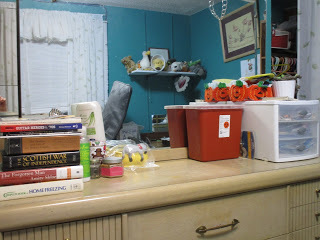
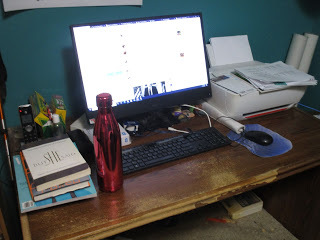
I'm not sure if anyone will find this a super-impressive transformation, but I feel better.
The most obvious change for me is that the only papers on my desk now are things I use for tracking various projects, which is much easier to do when there are not all of the other papers.
Less obvious is that it is easier to reach the crayons now, and my sketchbook is easily accessible on the printer. I should sharpen some pencils too, colored and regular. It is good for me to draw sometimes, and if getting the drawing materials requires risking an avalanche, I am much less likely to do it. Actually, I should really draw a new vision board.
You may also notice there is still a stack of books on both the desk and dresser. In fact, there are also three stacks of books on the equivalent of my nightstand (old wicker chest next to my bed) and a collection of Spanish and music books on a side surface. That's just me! That's not changing!
The less obvious thing that feels better relates to some of the things that led to the mess. As I wrote yesterday, I had filed all of the important forms and documentation and so much paperwork, and then I kept having to bring it back out for other things. There is a hope - easily squashed but it hasn't happened yet - that maybe I won't have to pull anything back out. I think it should at least be true of the mortgage.
I hope.
I still keep doing that.
Perhaps most importantly, it would have been very easy to put it off another day if I had not told you that I would do it today.



